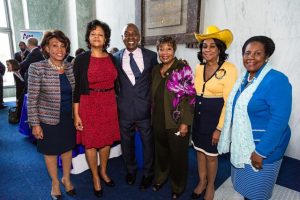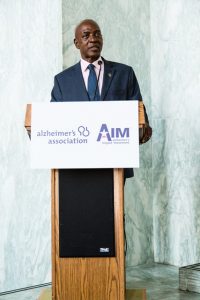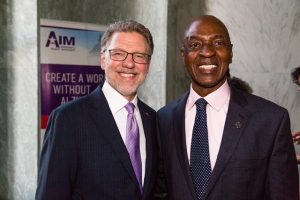
Double Your Impact for the Holidays
Double Your Impact for the Holidays
Your urgently needed year-end gift can go twice as far to provide care and support and accelerate Alzheimer's research this holiday season — and all year long. Show your giving spirit today during this 2x Match Challenge.
Donate Now“I’ve learned that every person’s Alzheimer’s journey is different – not one is the same,” the professor reflects. “It’s interesting, because in my case, I didn’t have any sense about what was happening to me as the disease came to light. I didn’t notice the symptoms of Alzheimer’s in myself. I was recently at a conference where I gave a speech about the disease and I was surprised to see how many people – black, white, all nationalities and backgrounds – were there, living with the disease or taking care of someone with the disease. It truly is affecting us all, and we must all join the fight to end Alzheimer’s.”

Professor Ogletree wants to encourage African-Americans, who have a higher risk for the disease, to become educated about Alzheimer’s – and encourage people to get an early diagnosis.
“Early detection and diagnosis is key. The most important thing is to not be afraid to talk about it, because talking about it will encourage other people to open up,” he says. “In every speech I give – sometimes on a weekly basis – I have been talking openly about my Alzheimer’s diagnosis. I’ve spoken to people with the disease and people who love someone with the disease. In a way, we are all in the same boat. It is amazing how many people are affected; something has to be done to slow this epidemic. We all have to tell our stories to keep the lines of communication open.”
 Professor Ogletree has been a mentor to many, including Michelle and Barack Obama, who both attended Harvard. The support of the former President, who released a statement about Ogletree’s diagnosis last year, along with family, friends and colleagues isn’t lost on the professor.
Professor Ogletree has been a mentor to many, including Michelle and Barack Obama, who both attended Harvard. The support of the former President, who released a statement about Ogletree’s diagnosis last year, along with family, friends and colleagues isn’t lost on the professor. “It is so important for people with a diagnosis to have the support of their loved ones; I think it matters very much. My son Chuck (Charles III) visits Boston to spend time with my wife Pamela and I, and my daughter Rashida will be getting a visit from us soon in her new home. Every Thanksgiving, Pamela and I spend the first part of the holiday at home and then travel to my son; every Christmas, we do the same with our daughter. I have a good friend from Mississippi who has been very supportive, along with his wife. Having their support while I continue to fight this disease means the world to me.”
When it comes to his own journey, exercise and keeping busy with activities are an important part of his daily routine.
“My wife is trying to keep up with me! I like to run – running is definitely very important to me. I enjoy attending Harvard basketball games, even if they didn’t quite make the tournament this year! I also stay involved with the community by attending lunch and dinner social events. I feel that it’s important for me to keep active, mentally and physically.” Public service and seeking justice have been a huge part of Professor Ogletree’s background, and he has begun a new fight for reason. “I talk about Alzheimer’s disease everywhere I go; I don’t shy away from it. The people I have spoken to are very responsive to my message of continuing to fight – and hope – and I find triumph in that.”
The professor continues to believe education and lifelong learning are vital, both for those living with dementia and those who are not.
After he defended Tupac Shakur in court in the turbulent year of 1993, Tupac’s mother asked Ogletree to try and convince Tupac to apply to Harvard. “It was so interesting to have that experience. Tupac was a talented guy who could have taken a Harvard education very far. In the end, he decided it was not for him. These days, I still work with students who apply to and attend Harvard. Educating every child we can is key, because that key can turn a life in the right direction. I try to inspire new generations and show them how far an education can take them. It fills me with joy when my students embrace their education; their hard work shows in their successes. They – and I – don’t take our time together for granted.”
 As for his personal view of his impact on society, Professor Ogletree is very clear about what his legacy will be. “I want to be known as the guy who was always concerned about justice and equality. Nothing more, nothing less.” There is no doubt he will be, and given how much he is talking openly about his Alzheimer’s diagnosis – and educating others about his own disease experience – he hopes he will be known for that as well. “My next fight has begun. I am ready.”
As for his personal view of his impact on society, Professor Ogletree is very clear about what his legacy will be. “I want to be known as the guy who was always concerned about justice and equality. Nothing more, nothing less.” There is no doubt he will be, and given how much he is talking openly about his Alzheimer’s diagnosis – and educating others about his own disease experience – he hopes he will be known for that as well. “My next fight has begun. I am ready.”Learn More:
